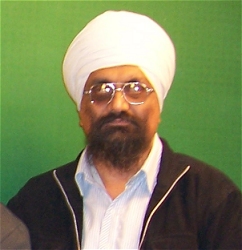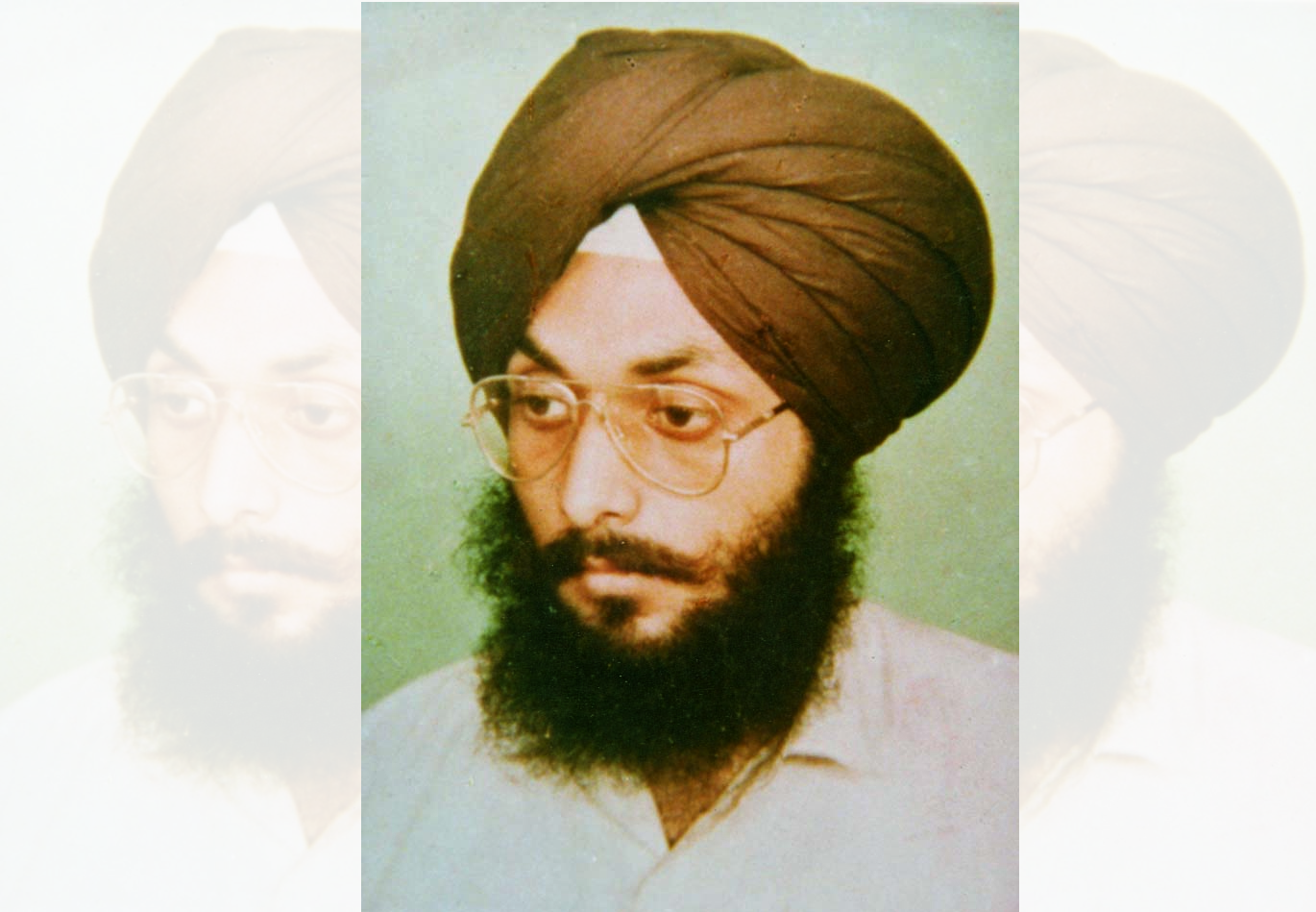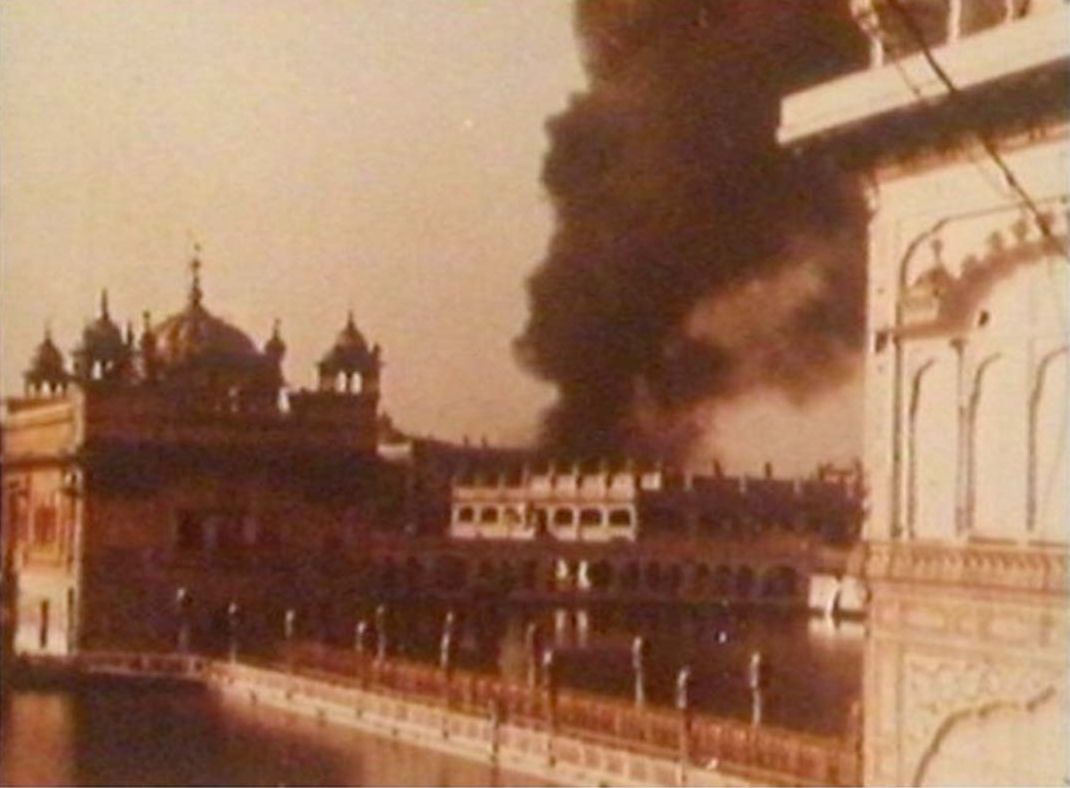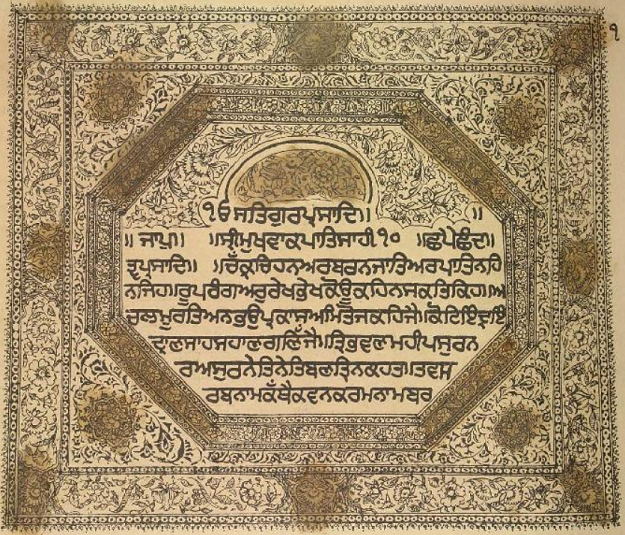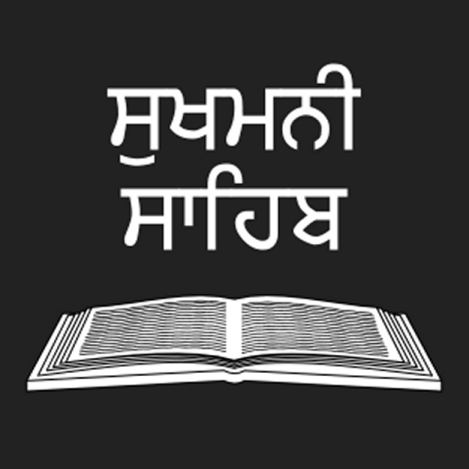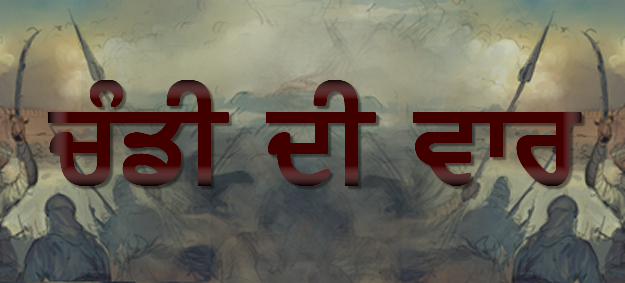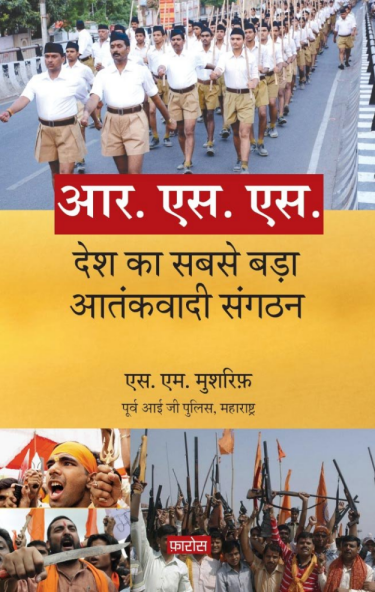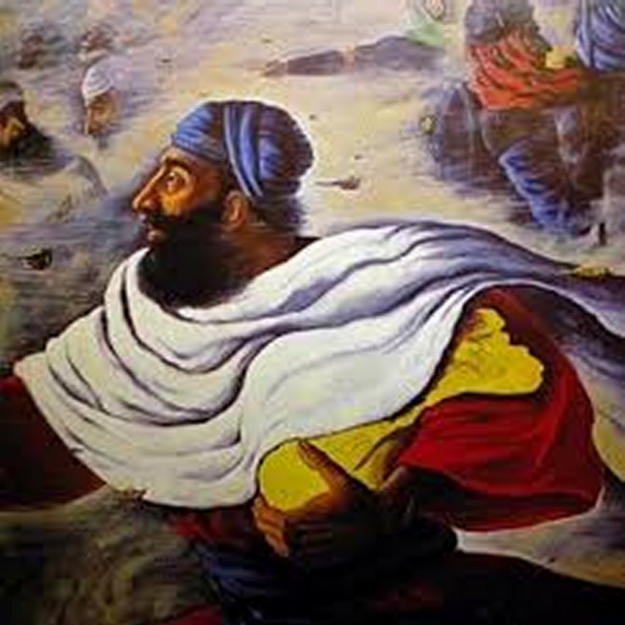
Introduction
The essential five external Sikh-Symbols (5 Ks) are a unique gift to a Sikh from the Great Guru Gobind Singh Sahib and a baptised Amritdhari Sikh should, under no circumstances, willingly part company with any of them. Among four prohibitions (Kurehet) removal of Kesh (hair) is the most significant. To keep hair intact is the first and the foremost duty of a Sikh. The Guru gave paramount importance to Kesh as is apparent from the fact that in the sweet memory of First Sikh Amrit (Baptism) Ceremony of Five Beloved Ones, the relevant place at Anandpur Sahib was named Kesh-Garh.
The Sikh Panth are proud of one of their great sons, Bhai Sahib Bhai Randhir Singh Jee, who lived a life of a true Gursikh and suffered every hardship in the true sense of a determined and completely dedicated Sikh of modern times in treading the path shown by the Gurus. He sang Akhand Kirtan and loved Gurbani from the inner depths of his heart. His viewpoint on the basic and fundamental question of Kesh (uncut hair) is best described in the dialogue between him (Bhai Sahib) and the prison Superintendent at Nagpur Prison, where he spent 7 ½ years out of his life-imprisonment because he had taken active part in the Freedom Movement during the first quarter of the 20th century. The dialogue makes an interesting reading strictly from a religious point of view. It reveals the deep faith Bhai Sahib held and sustained in the supreme Will of the Karta Purakh (God, the Creator) and the acceptance of God’s gift of Kesh, without meddling with it in any form.
What I have done in this respect, is an attempt to translate in English Bhai Sahib's writing on the subject from his book entitled "Letters from Prison", I have every hope that our younger Sikhs will, by reading through this, further strengthen their faith in one of the most prominent symbols of Sikh Dharma. This brochure is being printed with the concurrence of the Central Office of the Akhand Kirtani Jatha.
Kirpal Singh M.A.
Kent, UK
7th September 1979
Importance of Hair
Is it necessary to keep a full-length hair intact?
(A Dialogue between Bhai Sahib Randhir Singh Ji and the Prison-Superintendent Mr. Gupta at Nagpur prison.)
One day, it so happened that the Prison Officer bought a poor quality and a cheap brand of hair oil for our use while in prison. I refused to accept it, and asked him to get a better quality hair oil instead. I had already washed my hair with a strong soap, which had made my hair very rough and dry. I was to comb my hair only after it had been softened with hair oil in order to avoid damage to it. Without combing my hair, I was not going to take my meals. The Prison Officer, jailer and other staff with the exception of the new Prison-Superintendent, knew well about my problem.
I had washed my hair in the early morning, then midday came and passed and it was now late afternoon yet nobody bothered to supply me requisite hair oil. As a result of their negligence, I had to go without lunch and supper as well. Next morning it was Sunday and the Prison-Officer did not turn up for duty while the Prison-Superintendent usually stayed away on Sundays. On the third day, the Superintendent kept himself busy inspecting another section of the jail and nobody bothered to enquire about me. Everybody, perhaps, took it as a trifling matter and nobody brought me good quality hair oil. The prison superintendent knew nothing about it at all.
On the fourth day, when the Superintendent was on a round to our ward, the prison officer and others joined hands to complain against me telling him that, under protest, I had been on a hunger strike for the last four days. The helpless yet kind Superintendent came to see me and the succeeding dialogue commenced between us.
Prison Superintendent: Well, Randhir Singh! Ever since I have taken over here in this prison, this is the first time that someone has bothered and harassed me with a protest in the form of a hunger strike. Why haven’t you taken anything for so many days and why have you made me carry the burden of it all?
Myself: Good Sir, I haven’t done anything to make you feel the burden of my not eating anything for the last four days, nor have I harassed you in any manner. It just happened that I had washed my hair four days ago and I could not obtain proper hair oil for my use. Had I known that I was not likely to get proper hair oil, I would not have washed my hair with caustic soap on that day. After washing hair with caustic soap, it becomes rough, dry and entangled, and unless hair oil is applied, its combing becomes rather impossible. Hair oil softens the hair and they do not suffer from dropping off or breaking off during combing process. We, the Sikhs, have a strict religious order to comb our hair twice a day and we are forbidden to eat with our hair uncombed. So I could not eat anything out of respect for my religious commandments. It is not correct to say that I resorted to this as protest to your authority.
On hearing this, the kindhearted Superintendent got very much displeased with his prisonstaff and asked them why he was not informed of this problem earlier. He immediately ordered for a good quality hair oil. Within half an hour, good quality oil was brought and the Superintendent himself came and while handing it over to me he said very humbly, "Please forgive me, you had to suffer this trouble undeservedly because of my unawareness and absence. I should have respected your religious sentiments. I am sorry for what has happened this time. I promise it won't happen again."
Myself: Thank you very much. The fact is that both in the prison department and in other government departments, the sense of responsibility and integrity have vanished and the employees in general have become selfish and dishonest. The prison storemen buy the cheapest items for prisoners and charge the highest price from the government. Nobody bothers to investigate, especially in a prison. The poor prisoners do not dare make a complaint, and even if they do, no one listens to them. I have had a bitter experience during my prison sentence. There is a lot of meanness going on. There are only eight political and criminal Sikh prisoners in this prison. They would need hardly one large bottle of coconut oil for their use throughout the month, but these people depict such meanness that they bring the poorest quality oil and in this way, they cheat the government and exploit the poor prisoners.
The prison Superintendent listened to this all and accepted the criticism of the misdeeds of prison management. He assured me that he’d be taking steps to remedy these shortcomings. Then, all of a sudden, he raised a question and asked me, 'IS IT NECESSARY TO KEEP LONG HAIR?’
Myself: Is it necessary to keep the head on the human body?
Supdt: The body cannot survive without the head.
Myself: If, however, it could survive, would you be willing to get rid of it? (If the body could survive without the head, would you remove the head?)
Supdt: The head is more important and is an integral part of the body. With the head the body becomes complete and without the head, body cannot survive at all.
Myself: Have you placed the head on your body yourself?
Supdt: No, God has placed it there.
Myself: Undoubtedly God has placed the head on your body. If, however, it were placed by you, perhaps, you could afford to remove it as an unwanted burden.
Supdt: Of course. But how can we remove or afford to get rid of something given to us by God?
Myself: Well, suppose, if someone removes that God-given head from the body, what would you call that person?
Supdt: Undoubtedly, he would be called a tyrant, oppressor, murderer and an assassin.
Myself: If someone asks you questions as to why you have kept a head on your body, what will you think of him?
Supdt: It would be a sheer stupidity on the part of the questioner.
Myself: Just the way, our heads are placed on our bodies by the Creator Himself, the same way, the hair on my head and yours as well, have been grown by the same God, the Creator. Therefore, your question regarding keeping of long hair is irrelevant in itself, because it is not I who has grown it there, but the hair is God's gift. Just as the head on the body is God's special gift, so is the hair given by Him. It is our first and foremost duty to look after the hair (God's gift) as we would like to look after and protect our head. Those who do not maintain God-given gift on the head, (cut off or completely shave off their hair), are, in my well-considered view, ungrateful and disloyal to the supreme will of God. I consider them murderers.
Supdt: No, they cannot be called so, you can give them some other name, because in cutting hair no blood is spilt.
Myself: You mean if blood is spilt, then alone it can be called a murder or assassination. What if someone is strangled to death? Would you still not declare it a murder, because in strangling a person, no blood is spilt, though death does occur? It is no use indulging in verbal arguments. You know very well that in certain methods of murder, not even a drop of blood is allowed to spill. Would you not call perpetrators of these crimes as murderers? If not, what else will you call them?
Supdt: Excuse me, the head when once chopped off renders the body dead and the head does not grow again. But on the other hand the hair completely shorn off or hair cut short start growing again. There is a world of difference between the two instances.
Myself: Do you believe in reincarnation or transmigration of the soul?
Supdt: Yes, I do.
Myself: Nobody dies even after death, because the soul migrates. Those who kill others cannot kill their souls. The soul cannot die and it continues to take new births. The attempt to kill a soul goes in vain. There can be no success in doing this. In the same way, the effort of those who cut or shave their hair time and again, goes futile because the shaven or cut hair continue to grow again and again, the same way as the soul of a killed or dead person takes birth again and again. The difference, however, is only this that the soul moves on from one life to another and the killer or the murderer does not realise it, but the hair continue to grow until death of the person.
Persistent growth of hair acts as a rebuff to the efforts of the shaver. The way in which the life-spark of a soul exists in the total life-spark of God, the same way, the life-spark in the hair continues to exist in the life-spark of the human body until its (body's) complete destruction. It is very important that each hair on the human head and on the entire body be kept intact, because these are created there by God - our Creator. The hair on our head and body grow to such length as is needed by the physiology and biology of each individual body according to God's plan. The hair grows to certain length and then stops growing further naturally. Any attempt to undo the Creator's work by either trying to artificially make hair grow thicker and longer or get rid of it is our folly and also against the Law of God. Women do not have hair on the face. Any human attempt to grow it there would not succeed. Similarly, to cut hair from the head is also sheer folly. God - the Creator, has given beards to men but they shave them every day and try to look like women. But Nature does not let them do so. They shave but Nature administers a snub to them every morning by letting it grow again. The shavers receive double blow, one from the shaving blade and the other from Nature when every morning new beard comes out in defiance of their intentions. But they do not wake up to the ultimate Reality. Women as well suffer humility when they try to cut their hair and look like men by imitating them in this mad pursuit. Both male and female have gained absolutely nothing from this pursuit.
The question should have been "Why Nature's gift (Hair) should not be left intact on the head and elsewhere and why should it be cropped?" But, surprisingly, questions are asked the other way. The stark reality is that there is an overwhelming majority of people who defy the Divine because of this habit inherited from others through centuries and have mistaken the shaven face and shorn hair as a natural form. The reason is that, in the world, there are so few and so rare people who stick to and are consistent with the Eternal Law of Nature. When any person from powerful nations of the world chances to have a glance at a Sikh in natural form, he wonders at the latter's completely natural face and asks the question: "Is it necessary to keep hair intact?" In his ignorance he forgets that hair like other limbs of the body is part and parcel of the human body. A Sikh would never allow a single hair to be removed from his body because he bows to God's Law, he understands that hair growth has a purpose behind it and believes it a sin to do otherwise; just as a doctor would not advise to close a pore on the body.
This is a very complex question you have raised. Volumes can be written on this topic. We do not have enough time at our disposal to do full justice to the discussion on the sanctity of our hair. Those who raise such objections are usually Arya Samajists. Are you not prejudiced like them?
Supdt: (Smiling) No, I am not that much of an Arya Samajist, though, to some extent I am inclined towards Arya Samaj beliefs and practices. But I have asked this question to you just spontaneously. Even though you have used some very blunt epithets but I have, all the same, liked the line of your argument. A lot of my misconceptions and suspicions have vanished now.
When you leave jail, I wish you would write a detailed book on the philosophy of hair and propagate it throughout the world in all languages. Your argument that in cropping hair or shaving beards people just follow suit, like the movement of an individual sheep in a flock, has impressed me. All of our rishies, sages and prophets in the ancient times, were kesbadharis (with natural unshorn hair), which means they kept their hair intact. There is evidence that up to Mahabharat times all Khatries, Brahmins and religious leaders used to have long hair intact. In old Hindu books and scriptures it is written down how ignoble it was to cut hair and it was, in fact one of the seven punishments under the then state law. Lord Krishna, our Avtar, substituted cutting off hair of Rukmani's brother Rukman for death sentence in pursuance of her appeal to save his life. Rukman was so angry with this. He was so much grieved that he called his sister his enemy, because it was she who had recommended the cutting off his hair. Rukman himself thought that this punishment was worse than the death sentence.
I value your viewpoint, you are really a Singh with high ideals, Sardar Randhir Singh! No other Singh has ever convinced me like this. A grain of cogent argument is more than sufficient for a seeker after truth. Well, time has passed so quickly. Let us leave it there. Namaste. We will see to the rest later on.
Myself: Sat Sri Akal. 'Later on', surely does not so easily.
To be honest, the occasion to continue that dialogue 'later on’ never arrived again, but that prison Superintendent struck me as a very kind and a thoughtful person.


